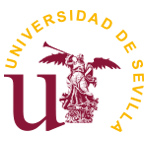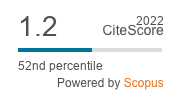Una perspectiva filosófica y sociológica de la competencia profesional ambiental en la educación superior
DOI:
https://doi.org/10.12795/revistafuentes.2020.v22.i2.02Keywords:
competencia profesional ambiental, dimensión ambiental, educación superior, ingeniería civilAbstract
Resumen
El abordaje de la competencia profesional ambiental y su importancia en la Educación Superior surge como respuesta a los problemas ambientales de la actualidad. El objetivo de este análisis con perspectiva filosófica y sociológica es identificar la necesidad de formar profesionales con competencia ambiental, capaces de evaluar impactos ambientales positivos y negativos que surgen del diseño y construcción de obras civiles, con presentación de soluciones de prevención, mitigación, remediación, y/o compensación a fin de disminuir, atenuar y evitar el impacto negativo al medio ambiente, orientada hacia el desarrollo sostenible, desde un enfoque cognitivo y humanista, con ética ambiental y modos de actuación profesional. Se realiza el histórico lógico de la educación ambiental, la dimensión ambiental y el término competencias, mediante el análisis de diferentes conceptualizaciones a través del tiempo para construir la definición de competencia profesional ambiental y establecer su importancia como pilar fundamental en la educación superior con énfasis en la ingeniería civil. Se proponen planes de acción relacionados a: la capacitación docente y a la inclusión transversal de la competencia profesional ambiental, a través de proyectos investigativos individuales o grupales, proyectos de fin de carrera con inclusión de una sección que evalúe los impactos ambientales generados por el proyecto, prácticas preprofesionales y prácticas de vinculación comunitaria.
Abstract
The approach of environmental professional competence and its importance in Higher Education arises as a response to the environmental problems of today. The objective of this analysis with a philosophical and sociological perspective is to identify the need to train professionals with environmental competence, capable of evaluating positive and negative environmental impacts arising from the design and construction of civil works, with the presentation of solutions for prevention, mitigation, remediation, and compensation to decrease, mitigate and avoid negative impact on the environment, oriented towards sustainable development, from a cognitive and humanistic approach, with environmental ethics and professional ways of acting. The historical presentation of the environmental education and the term competencies are made through the analysis of different conceptualizations over time to build the definition of professional environmental competence and establish its importance as a fundamental pillar in higher education with an emphasis on civil engineering. Action plans related to teacher training and the transversal inclusion of environmental professional competence are proposed, through individual or group research projects, end-of-degree projects with the inclusion of a section that evaluates the environmental impacts generated by the project, practices pre-professionals and community practices.
Downloads
References
Acosta, M. (2005). Tendencias pedagógicas contemporáneas: La pedagogía tradicional y el enfoque histórico-cultural. Análisis comparativo. Revista Cubana de Estomatología, 42(1). doi:1561-297X
Alonso, Álvarez y Castillo. (2016). Environmental Professional Competence Education: A Need of University Students and Present. (A. R. Development, Ed.) Journal of Education and Human Development, 5(1), 142-145. doi:10.15640/jehd.v5n1a15
Arias, C. H. (1995). La Dimensión Ambiental y la Educación. Nómadas (Col), 10. Obtenido de http://www.redalyc.org/articulo.oa?id=105115242012
Barriga, C. (2000). Objetivos versus competencias: una oposición imposible. Educación Superior de la Unidad de Post Grado de la Facultad de Educación de la UNMSM. Año II(2), 35-58. Recuperado el Diciembre de 2016
Clugston, Calder y Corcoran. (2002). Teaching Sustainability with the Earth Charter. (L. Peter, Ed.) Teaching Sustainability at Universities, 15. Retrieved junio 2016
Della Porta; Keating, M. (2013). Enfoques y Metodologías de las ciencias sociales., (págs. 31-51). Madrid: Akal.
DeSeCo. (2005). The definition and selection of key competencies. Executive Summary. Key DeSeCo publications. Obtenido de https://www.oecd.org/pisa/35070367.pdf
Flórez-Yépes, G. (2015). Environmental Education and Sustainable Development in the Colombian Context. Revista Electrónica Educare, 19(3), 1-12. doi:10.15359/ree.19-3.5
Huertas, J. (2008). Las teorías de la Motivación desde el ámbito de lo cognitivo y lo social. Universidad Autónoma de Madrid. doi:ISBN 978-84-481-6101-9, págs. 69-94
Melendro, Murga, Novo, Bautista. (2008). Estrategias Formativas Innovadoras en Educación. (U. Universidad Nacional de Educación a Distancia, Ed.) Revista Iberoamericana de Educación a Distancia RIED, 11(2), 15-39. Recuperado el 18 de enero de 2017, de http://www.redalyc.org/comocitar.oa?id=331427209002
PNBV. (2012). Plan Nacionam del Buen Vivir PNBV. Quito, Ecuador: Gobierno Naciaonal del Ecuador.
PNUMA, U. . (1983). Investigación, experimentación y evaluación en educación ambiental. Conferencia de Tbilisi (pág. 29). No. 81.
Sáenz, O. (2012, p. 32). La Formación Ambiental Superior. Bogotá, Colombia: U. D. C. A. Recuperado el 30 de NOVIEMBRE de 2016
Tejada, J., & Navío, A. (2005). El desarrollo y la gestión de competencias profesionales: una mirada desde la formación. Revista Iberoamericana de Educación (ISSN: 1681-5653), 37(2), 16. Obtenido de https://dialnet.unirioja.es/servlet/articulo?codigo=3197116
Tobón, Pimienta y García. (2010). Secuencias Didácticas: Aprendizaje y Evaluación de Competencias. (G. C. Morales, Ed.) Veyra, 216.
Tobón, S. (2013). Formación integral y competencias. Ecoe Ediciones.
Tuning, P., Temáticas, A., Europa, T., & Latin, T. (2007). Proyecto Tuning América Latina. Obtenido de http://tuning. unideusto. org/tuningal.
Unesco. (1980). La educación ambiental: las grandes orientaciones de la Conferencia de Tbilisi. París, Francia: Organización de las Naciones Unidas para la Educación, la Ciencia y la Cultura . doi:92-3-301787-7
UNESCO. (2016). UNESCO, 8-10. Recuperado el 13 de marzo de 2018
Valdés, Martínez y Camacho. (Febrero de 2017). La Dimensión Ambiental para el Aula Innovadora: Un contenido Educativo Digital por la No Contaminación Tecnológica. Revista boletín virtal REDIPE, 6(2), 45 a 54.
Vigotsky, L. S. (1983). Historia del desarrollo de las funciones psíquicas superiores. La Habana, Cuba: Científico – técnica.
Vigotsky, L. S. (1985). Pensamiento y lenguaje. Buenos Aires: Editorial La Pléyade Buenos Aires.
Downloads
Published
How to Cite
Issue
Section
License
Copyright (c) 2020 Revista Fuentes

This work is licensed under a Creative Commons Attribution-NonCommercial-ShareAlike 4.0 International License.
Authors who publish in this journal accept the following conditions:
Authors conserve the copyrights and cede to the journal the right for first publication, with the work registered with the attribution licence of Creative Commons, which allows third parties to use the published work as long as they mention the authorship and the first publication in this journal.
The authors may make other independent and additional contractual agreements for the non-exclusive distribution of the version of the article published in this journal (e.g. include it an institutional repository or publish it in a book) as long as it clearly indicates that the work was first published in this journal.
Authors are allowed and indeed recommended to publish their work on the internet (for example on institutional or personal pages) before and during the revision and publication process, because it can lead to productive exchanges and greater and faster dissemination of the published work (see The Effect of Open Access).
Accepted 2020-05-14
Published 2020-09-17
- Abstract 512
- PDF (Español (España)) 287














